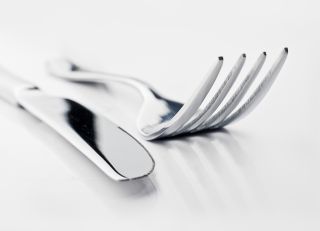Health
Counting Calories? Try “New Math” Instead
Consider new ways to approach eating, as well as body and life appreciation.
Posted April 1, 2024 Reviewed by Devon Frye
Key points
- Our culture promotes dieting as an acceptable way of life, despite the many risks and negative consequences.
- Considering “New Math” metaphors can allow an alternative perspective to approaching meal and life planning.
- Individuals struggling with significantly disordered eating can be helped with specialized treatment.
Counting calories can be like engaging in ongoing mental math torture. There is usually an exhausting focus on various mathematical calculations, including calories consumed, calorie expenditure, rigid meal planning, exhaustive menu examination, weight analysis, clothing size scrutiny, and a myriad of other mental gymnastics that undermine concentration, increase guilt, and decrease focus upon joyful life activities.

For some individuals, this food deprivation focus can be part of a developing or well-entrenched eating disorder; however, our society’s focus on a confusing array of messages about eating and body image creates vulnerability for much of the general public. We see media images that promote unrealistic (and generally unreal) bodies paired with supersized food options, headlines about “obesity prevention” programs alongside news stories about eating disorder alerts, and push for perfection alongside marketing for indulgence. It is no wonder that we have decades of different diets and confusion about how to approach the basic domain of eating.
Eating is a daily, human requirement. Some individuals have little difficulty engaging in intuitive eating or attending mindfully to hunger and fullness signals. But for those who find themselves focusing regularly on negative number crunching (or think they should be), considering a metaphorical “New Math” might actually be what is much more satisfying and effective.

New Math Subtraction
Diet culture focuses on what or how to cut out or avoid foods. Sneaky subtraction tactics are presented as logical and necessary but are really duplicitous and devious.
What I call "New Math Subtraction" might involve finding other things to cut out of your current routines instead, like negative self-talk and constant criticism. Perhaps this involves cutting out time spent on certain social media sites or with certain competitive friends.
Let’s reject weightism and fat phobia; just as we aim to not judge others by their skin color, can we also avoid judging others or ourselves based on body weight or shape? This means respecting someone’s character traits and accomplishments rather than their body shape.
This might involve getting out of an old routine of not eating at family dinners and instead cutting out the habit of not speaking up. Rather than avoiding certain taboo foods, is there perchance a need to cut out a false assumption or negative association? If you are noticing a tendency to engage in mindless eating or undereating with certain stressors, perhaps some focus on decreasing the stressor would be more helpful in the long term?
What else needs to be subtracted from your current thinking patterns, behavioral interactions, relationships, and life routines in general that would substantially enhance your current health and happiness? When subtraction urges begin to take hold, can we stop and switch gears to figure out what else might be subtracted instead? Subtracting and deleting that which truly needs to be deleted is freeing.
New Math Addition
Individuals who are worrying about calories are sometimes adding in behaviors as a means of avoiding hunger, such as chewing gum to manage hunger pangs or over-exercise to undo the anxiety of having had a snack. Someone might feel the need for excessive mirror analysis or rumination about how to “make right” any perceived failing. Addition anxiety can lurk around every bend.
With "New Math Addition," there are multiple add-ins to consider. We all need food every day, multiple times per day, ideally from various food groups. Listen to your body and notice if there are categories missing from daily intake. Eat what appeals to you in a moderate, balanced fashion.
Cope with life's difficulties by adding in healthy coping techniques, not by taking it out on your body. Problem solve, rather than create problems to avoid dealing with the true source of stress. Instead of spiraling continuously around self-critical, negative thoughts about body weight, body image, and food intake, can we find focus on more purposeful life goals? Seek out true forms of happiness and fulfillment. Aim to creatively consider what else we really need more of in their lives.
This requires a broader perspective, moving away from torment and instead finding ways to add in more joy, fun, and relaxation. What else would you like to be included in your life? What else has needed to be said or revealed that has been missing from conversations for far too long? What has been absent since engaging in calorie over-focus and could be added back in? Looking for those add-ins that truly enhance day-to-day living from the inside out creates a whole new dimension of living.

New Math Multiplication
Multiplication misery comes in various forms, such as repeatedly rounding up calorie estimations, distorted message cycling, and falling into mirror distortion trickery. Just because dieting and body focus have become a pastime in the United States, it doesn’t mean it has to be your pastime as well.
"New Math Multiplication" focuses on more authentic ways of maximizing enjoyment. Orienting to and actively seeking out more of the good is complex at the beginning but becomes increasingly easier as new routines are established. Like learning the times tables, there is effort needed at first but then the calculations become second nature.
Can we find a way to practice reviewing the positive experiences and moments of gratitude twice as often as the negative? Are there activities that would be double the fun with a good friend? Can we orient to how the delight of a meal or the comfort of an outfit might be quadrupled? Multiplier effects can create an explosion of positive experiences.
New Math Division
Apples cut in half, sandwiches into quarters, or brownies into sixths are not uncommon partitioning practices for those struggling with food worries. There is often the concern about how much is too much, and then the derogatory division begins.
Instead of cutting the serving in half, can we explore ways of cutting the tension in half? An obsession with food or the body can often lead to a deterioration in concentration, energy, emotional stability, relationships, and overall daily functioning; rather than focusing on depletion efforts, can we find ways to eat regularly throughout the day for adequate energy input and then return to living rather than simply dieting?
Can we divide up the unrealistic workload instead of the next snack? Any task—including managing fear, anxiety, and confusion—is generally made significantly easier when shared with others. Rather than hiding behavior or denying that eating patterns are problematic, can we cut that out and instead admit honestly to what is going on?
Those stuck in dieting anguish often spend so much worrying secretly and calculating cunningly that this notion of sharing and letting in others will be hard, but this ultimately distributes the difficulty so much more effectively. Dividing the things that truly need sharing and balance rather than the nutritional intake needs allows a more stable and settled focus overall.

Knowing When to Get More Help
While some people find it useful and manageable, calorie counting and dieting focus can be a starting point for very serious disordered eating patterns. This lighthearted perspective about “New Math” is not an indication that shifting patterns is simple—nor does it serve as an outline for the multifaceted treatment needs.
Eating disorders are a complex combination of physical and psychological issues for individuals of all body shapes and sizes. They seldom stop without specialized professional intervention and, when left untreated, can result in serious emotional, behavioral, and physical consequences.
Noticing more and more focus on issues related to food, body, exercise or related factors is usually an indication that the situation is getting worse. Proper treatment can make a difference, and recovery is absolutely possible. The process of recovery is usually long-term, difficult, and fraught with complications, but the journey back to health can be very successful and enormously gratifying.
The time and energy invested into maintaining rituals, coping with misguided guilt, and obsessing over body parts is staggering, yet those who eventually give up disordered behaviors can find ways of having a fuller, richer life. To find mental health support near you, visit the Psychology Today Therapy Directory.




